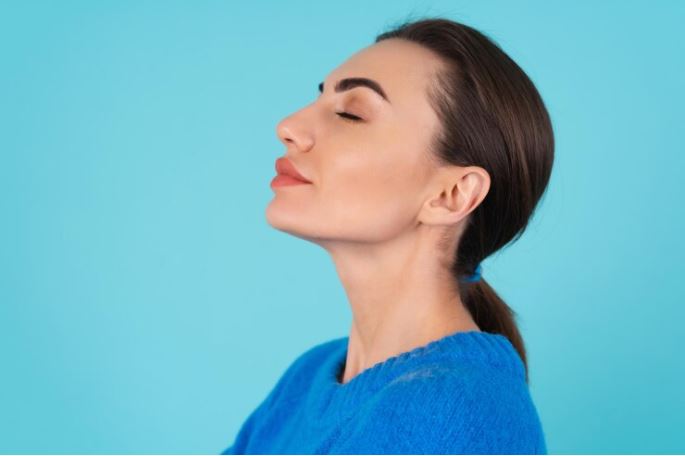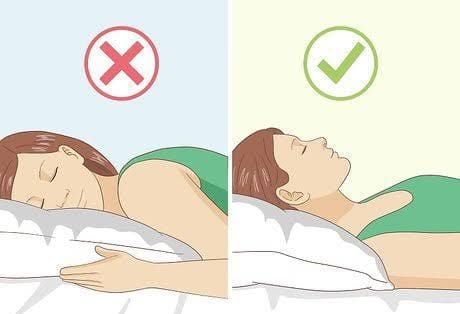
Poor sleep can contribute to a puffy or swollen appearance of the face due to water retention and hormonal imbalances that affect appetite and weight gain, leading to increased fat storage.
Ways to reduce facial fat include exercising regularly, eating a balanced diet rich in whole fruits and vegetables, limiting processed and sugary foods, and staying hydrated.
Other certain lifestyle and diet changes can further help a person lose weight and achieve a slimmer-looking face.
This article outlines seven effective tips that may help prevent and reduce excess facial fat.
Here’s a more detailed explanation:
- Water Retention:Lack of sleep can lead to water retention, causing your face to appear puffy or bloated.
- Hormonal Imbalances:Sleep deprivation can disrupt the balance of hormones like ghrelin (which stimulates appetite) and leptin (which signals fullness), potentially leading to increased appetite and weight gain, including in the face.
- Increased Appetite and Snacking:When you’re sleep-deprived, you’re more likely to crave unhealthy foods and snack more frequently, which can contribute to weight gain, including in the face.
- Indirect Impact on Weight Gain:Poor sleep can indirectly affect your metabolism and fat oxidation, potentially leading to weight gain and fat storage, including in the face.
- Other factors:Genetics, poor diet, lack of hydration, and stress can also contribute to facial puffiness.
- Home Remedies:Some simple remedies for puffy face include drinking plenty of water, reducing salt intake, applying a cold compress, and getting adequate sleep.
- When to seek medical advice:If facial swelling persists or is accompanied by other symptoms, it’s important to consult a healthcare professional.
Quality sleep is crucial not only for overall health but also for maintaining a leaner and more toned face. Poor sleep or irregular sleep patterns can lead to various changes in the body that contribute to face puffiness and bloating. When we don’t get enough sleep, the body’s production of cortisol, a stress hormone, increases. Elevated cortisol levels can lead to water retention, making the face appear swollen and puffy. Inadequate sleep also affects the production of growth hormones.
Introduction
A good night’s sleep is essential for overall health and well-being, but did you know it also affects your facial appearance? Poor sleep can contribute to facial puffiness and increased fat retention in the face, giving it a bloated or tired look. While there are many factors that influence face fat, sleep plays a crucial role in regulating hormones, inflammation, and water retention, all of which can impact the appearance of your face. This article explores how poor sleep contributes to face fat, what happens during sleep that affects your face, and how to improve your sleep habits to achieve a more defined and refreshed look. Sleep plays a crucial role in our overall health, and its impact extends beyond just our mental and physical well-being; it can also significantly affect the appearance of our face. One of the most noticeable effects of poor sleep is the development of facial puffiness, which can make the face appear bloated, tired, and aged. Sleep deprivation and poor sleep quality disrupt the body’s natural processes, including those responsible for regulating fluid balance, inflammation, and collagen production, all of which can contribute to increased facial fat or puffiness. When we don’t get enough sleep, the body’s circadian rhythm, which governs sleep and wake cycles, gets disturbed, leading to hormonal imbalances that can cause the retention of excess fluid, particularly in the face. This fluid retention, also known as edema, leads to puffiness, especially around the eyes, cheeks, and jawline, making the face look swollen and less defined. Poor sleep also impacts the production of cortisol, the body’s primary stress hormone. Elevated cortisol levels, often associated with sleep sleep deprivation, can promote fat storage, especially in the face and abdominal areas. This accumulation of fat can make the face appear fuller or rounder, diminishing its natural contours. Furthermore, sleep deprivation increases the production of the hormone ghrelin, which stimulates appetite, leading to cravings for high-calorie, unhealthy foods. When we indulge in these cravings, especially processed foods, sugary snacks, and salty items, the excess intake of sodium and sugar can cause the body to retain more water, further exacerbating facial puffiness. Inadequate sleep also affects the production of collagen and elastin, proteins responsible for maintaining skin elasticity and firmness. With chronic sleep deprivation, collagen production decreases, leading to sagging skin and fine lines, making puffiness around the face even more noticeable. This loss of collagen can also contribute to the hollowing of the cheeks and the development of under-eye bags, which are commonly seen in individuals who don’t get enough rest. Another important aspect of sleep and its connection to facial fat involves the body’s ability to detoxify during the night. When we sleep, the body goes into repair mode, and one of the critical functions is the removal of waste products from the brain and other tissues. However, during poor sleep, this detoxification process is impaired, which can cause the accumulation of toxins and waste products in the body. These toxins can lead to inflammation, which, in turn, contributes to puffiness and a bloated appearance in the face. Sleep also impacts the function of the lymphatic system, which is responsible for draining excess fluids and toxins from the body. A lack of restful sleep can slow down lymphatic drainage, causing fluid to accumulate in the face, further contributing to the appearance of puffiness. The position in which we sleep can also play a role in how sleep affects facial puffiness. Sleeping on your stomach or side can put pressure on the face and cause fluids to pool in the facial tissues. On the other hand, sleeping on your back with your head elevated can help prevent this fluid buildup and reduce puffiness. In addition to these physiological effects, poor sleep can also indirectly affect the face through its impact on mental health and stress levels.
Sleep deprivation is known to increase feelings of stress and anxiety, which can trigger the release of more cortisol, further compounding the problem of facial puffiness and weight gain. Moreover, inadequate rest can lead to fatigue, which manifests as tired, dull-looking skin. The face may appear tired and sluggish, and the lack of rejuvenation that comes with a good night’s sleep can result in a lack of vitality and radiance. As sleep deprivation becomes chronic, the cumulative effects on the face become more pronounced, leading to a more consistently puffy appearance. Chronic poor sleep can also disrupt the circadian rhythm of skin cells, which affects their ability to regenerate and repair. During deep sleep, the body produces growth hormones that stimulate skin regeneration, collagen synthesis, and cell turnover. Without adequate sleep, this regenerative process is compromised, leading to a breakdown of skin tissue and the appearance of sagging or puffiness. Over time, these effects can become more pronounced, making the face look older and less vibrant. The connection between sleep and facial puffiness is multifaceted and intertwined with numerous factors, including hormonal regulation, fluid retention, collagen production, and detoxification. Poor sleep contributes to facial puffiness by triggering fluid retention, disrupting hormonal balance, impairing detoxification, and decreasing skin elasticity. The resulting puffiness can make the face appear bloated, tired, and older. For those looking to combat facial puffiness and reduce the appearance of excess fat in the face, improving sleep quality is essential. Establishing a consistent sleep routine, aiming for 7-9 hours of quality sleep each night, staying hydrated, and practicing good sleep hygiene can help improve the overall appearance of the face. Additionally, adopting a healthy lifestyle with a balanced diet, regular exercise, and stress management techniques can further support the reduction of puffiness and the maintenance of a healthy, glowing complexion. Making sleep a priority not only improves your overall health but also has a significant positive impact on your facial appearance, helping you maintain a more sculpted, youthful, and vibrant look.

Understanding the Connection Between Sleep and Face Fat
The relationship between sleep and face fat goes beyond just looking tired. When you don’t get enough sleep, several physiological processes are disrupted, leading to increased water retention, hormonal imbalances, and higher inflammation levels—all of which can contribute to puffiness and bloating in the face.
1. Hormonal Imbalance
During sleep, your body regulates key hormones involved in metabolism, hunger, and fat storage. Inadequate sleep can disrupt these hormones, particularly cortisol (the stress hormone) and insulin.
- Cortisol: When you’re sleep-deprived, cortisol levels can rise, leading to increased fat storage, particularly around the face and abdomen. Elevated cortisol levels also lead to inflammation, which can cause puffiness and swelling.
- Insulin: Sleep deprivation can make your body more resistant to insulin, which can lead to higher blood sugar levels. This, in turn, promotes fat storage, including in the face.
2. Water Retention
One of the most noticeable effects of poor sleep is water retention. When you’re not getting enough rest, your body struggles to manage sodium and fluid balance, which leads to bloating and puffiness. The face, being one of the most sensitive areas for fluid retention, often shows the signs of this imbalance. Lack of sleep can make your face look swollen, especially around the eyes, cheeks, and jawline.
3. Increased Inflammation
Chronic sleep deprivation leads to systemic inflammation, which can cause the body to retain more fluid and store fat in various areas, including the face. Inflammation also affects skin health, causing it to look dull, puffy, and less vibrant. This is why people often look tired or “puffy” after a poor night’s sleep.
How Poor Sleep Affects Your Skin and Face Fat
Apart from contributing to weight gain, sleep deprivation negatively affects the skin’s appearance. The skin on your face is particularly sensitive to disruptions in your body’s natural cycles, such as those caused by poor sleep. Here’s how lack of sleep affects your face:
1. Dull Skin Tone and Puffy Eyes
Sleep is when your body performs its essential repair work. During deep sleep, the skin rejuvenates, repairs damaged cells, and produces collagen. Lack of sleep interferes with these processes, leading to a dull complexion and tired, puffy eyes. The skin under the eyes is particularly thin, so fluid retention is more noticeable here.
2. Decreased Collagen Production
Collagen is the protein responsible for skin elasticity and firmness. Poor sleep disrupts collagen production, making the skin lose its tone and firmness, resulting in sagging or puffiness. This contributes to the appearance of facial fat, as sagging skin may give the illusion of extra fullness.
3. Increased Cortisol and Skin Aging
Chronic lack of sleep elevates cortisol levels, which can break down collagen and elastin fibers in the skin. This process not only accelerates skin aging but also leads to puffiness and swelling in the face, especially in the morning.
How to Improve Sleep and Reduce Face Puffiness
While poor sleep can contribute to face fat and puffiness, adopting better sleep habits can help reverse these effects and restore a more refreshed appearance. Here are a few tips to improve your sleep and reduce facial puffiness:
1. Aim for 7-9 Hours of Sleep
The National Sleep Foundation recommends 7-9 hours of sleep per night for optimal health. Consistently getting enough rest allows your body to regulate hormones, manage inflammation, and maintain healthy fluid balance—all of which contribute to a more defined and less puffy face.
2. Create a Relaxing Bedtime Routine
A relaxing bedtime routine can help prepare your body for restful sleep. This includes activities like reading, taking a warm bath, practicing deep breathing exercises, or meditating. Avoiding screens, caffeine, and heavy meals right before bed will help you fall asleep faster and enjoy a deeper sleep.
3. Sleep on Your Back
Sleeping on your stomach or side can put pressure on your face, leading to fluid retention and puffiness. Sleeping on your back with your head slightly elevated helps prevent fluid buildup around the face, especially in the under-eye area.
4. Stay Hydrated

Dehydration can exacerbate facial puffiness, even when you’re sleeping. Make sure to drink plenty of water throughout the day to maintain proper hydration. However, avoid drinking too much water right before bed to prevent waking up during the night to use the bathroom.
5. Manage Stress Levels
Since stress is a major contributor to poor sleep and elevated cortisol levels, managing your stress is key. Incorporate stress-reducing activities into your routine, such as yoga, meditation, or spending time outdoors, to help promote better sleep and reduce facial puffiness.
6. Use Cooling Eye Masks or Compresses
If you’re waking up with puffy eyes or a swollen face, using a cooling eye mask or compress can help reduce inflammation and fluid retention. The cold helps constrict blood vessels and reduces puffiness, giving your face a refreshed appearance.
Eat a Balanced, Healthy Diet
One of the most common culprits of a puffy face is high salt intake. Too much salt causes your body to retain excess fluids, resulting in facial swelling.1 For example, processed foods often contain a lot of salt. Those foods may cause inflammation, too, worsening a puffy face.
Limit Inflammatory Foods
Avoid foods that may cause inflammation, such as processed foods, red meat, refined carbs, and sugary drinks. Inflammation may cause swelling, resulting in a puffy face
Instead, try upping your intake of inflammation-fighting foods like:
- Beans
- Carrots
- Fresh fruits
- Leafy green vegetables (e.g., broccoli, kale, and spinach)
- Peppers
- Pumpkins
- Whole grains
Those foods are rich in antioxidants, fiber, and vitamins that reduce the risk of heart disease.
Reduce Salt Intake
Your body uses sodium to aid muscle and nerve functions and control blood pressure.You get sodium from the salt in your food. Too much salt may cause your body to hold in extra fluid, making your face look bloated.
Experts advise limiting your salt intake to 2,300 milligrams, or about one teaspoon, per day.Check labels for how much sodium is in your food.
Foods with excess sodium usually list salt at the top of the ingredients list and may include:
- Bottled salad dressing
- Canned foods (e.g., anchovies, olives, pickles, and sauerkraut)
- Cheeses
- Processed foods (e.g., bacon, ham, hot dogs, and sausage)
- Snack foods (e.g., chips and crackers)
- Soy and Worcestershire sauces
- Tomato juice

You do not have to cut out those foods entirely. Instead, eat an overall balanced, healthy diet and indulge in moderation. Prioritize fresh fruits and vegetables, which are low in sodium. Cook with seasonings like garlic, herbs, lemon, and pepper.
Conclusion
Sleep plays a crucial role in regulating various bodily functions that affect your appearance, including fat storage, fluid retention, and skin health. Poor sleep not only contributes to increased face fat but also results in a dull complexion, puffy eyes, and overall facial bloating. By improving your sleep habits and ensuring you get adequate rest, you can reduce facial puffiness, promote collagen production, and achieve a more defined, youthful appearance.
Remember, quality sleep is as essential for your face as it is for your overall health. Aim for consistent, restful sleep and combine it with a balanced diet and lifestyle for the best results. Sleep plays a pivotal role in regulating hormones, managing inflammation, and supporting fat loss. By ensuring you get enough quality sleep each night, you help your body function optimally, reduce cortisol levels, and prevent water retention that contributes to a puffy face. Along with a healthy diet and exercise, prioritizing sleep is key for achieving a leaner face and healthier skin.
Q&A Section:
Q1: How does poor sleep cause face puffiness?
Ans: Poor sleep increases cortisol levels, a stress hormone that causes the body to retain water, leading to puffiness and bloating especially in the face.
Q2: Can sleep deprivation affect fat metabolism?
Ans: Yes, inadequate sleep can disrupt the production of growth hormones, which are essential for fat metabolism. This can slow down the fat-burning process and contribute to weight gain, including facial fat.
Q3: Does poor sleep cause dark circles and bags under the eyes?
Ans: Yes, lack of sleep leads to reduced circulation, causing blood vessels under the eyes to become more visible, which results in dark circles and puffiness.
Q4: How many hours of sleep are needed for optimal face health?
Ans: Most adults need between 7 to 9 hours of quality sleep each night to support hormone regulation, reduce inflammation, and prevent facial puffiness.
Q5: Does poor sleep lead to overall weight gain, or is it specific to the face?
Ans: While poor sleep can lead to weight gain throughout the body, it particularly affects the face due to water retention and hormonal imbalances that cause bloating and puffiness.
Q6: Can napping help reduce face puffiness?
Ans: Napping can be beneficial, but it’s important to maintain a consistent sleep routine. Short naps (20-30 minutes) can help refresh you, but longer naps or irregular sleep schedules can contribute to poor sleep quality and face puffiness.
Q7: Does improving sleep quality help reduce under-eye bags?
Ans: Yes, getting quality sleep helps the body recover and repair, which can reduce under-eye bags and puffiness over time.
Q8: Does drinking water before bed help with face puffiness caused by poor sleep?
Ans: While staying hydrated is important, drinking excessive water right before bed may lead to water retention overnight. A balanced intake throughout the day is key to preventing face puffiness.
Q9: Can sleep disorders like insomnia contribute to face fat?
Ans: Yes, sleep disorders like insomnia disrupt the body’s normal hormonal balance and can increase cortisol levels, contributing to face bloating and weight gain over time.
Q10: What lifestyle changes can improve sleep quality and reduce face puffiness?
Ans: Practicing good sleep hygiene, such as setting a consistent bedtime, limiting screen time before bed, and reducing caffeine intake, can significantly improve sleep quality and reduce face puffiness.